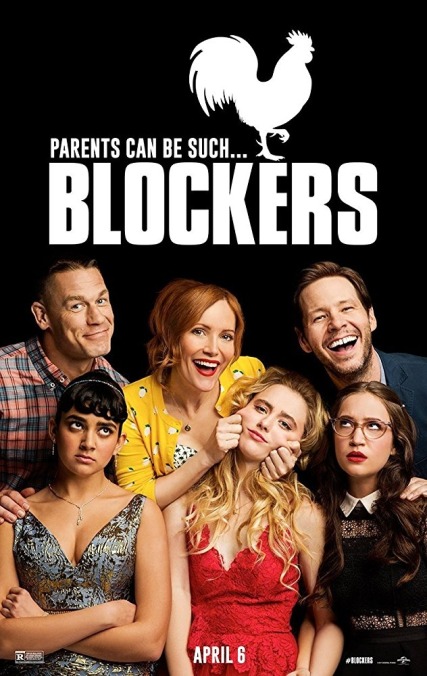The Apatovian Blockers is two comedies in one, and they're both pretty funny

It’s not uncommon for Judd Apatow movies to feature several superfluous characters—Greek-chorus types whose function in the movie is for Apatow to get some of his funny friends or up-and-comers to feed him amusing improvised lines. They contribute to both the relaxed, hangout vibe of his work, and also some of its meandering bagginess. The comedy Blockers, which is not written, produced, or directed by Apatow but feels descended from some of his work, sets for itself a more ambitious challenge, daring itself to give each member of its ensemble a coming-of-age arc, and to pull off two different high-concept comedies at once in the process.
The movie’s duo of trios run in parallel: Half the story is about three teenage girls who make an American Pie-style pact to lose their virginities on prom night of their senior year, and half is about three parents (one for each kid) who find out about the pact and attempt to put a stop to it (hence the sanitized title), ostensibly to help their kids from making rash decisions. Each coming-of-age storyline comes with a coming-of-middle-age storyline for an era when parents are perhaps less eager than ever for their kids to jump into the real world. Julie (Kathryn Newton) has a semi-serious boyfriend and a close relationship with her single mom, Lisa (Leslie Mann); Kayla (Geraldine Viswanathan) has a competitive spirit nursed by her protective dad, Mitchell (John Cena); and Sam (Gideon Adlon) is hiding her emerging homosexuality from her friends and family, including her neglectful dad, Hunter (Ike Barinholtz). That’s six major characters before even getting to the significant (or not-that-significant) others: the boys involved in the sex pact, or the parents who opt out of the anti-sex pact. That’s also two plotlines with enormous potential for icky sexual politics.
But the ick in Blockers mostly originates from some enthusiastic gross-out gags and the still-low quality of CG vomit, up there with CG blood spatter on the list of worst side effects of the computer-effects revolution. Director Kay Cannon, making her debut after writing the Pitch Perfect trilogy and working on 30 Rock, splices together a parental buddy comedy and half a Superbad with girls without making anyone involved seem like a moralizing creep. (Mitchell’s zeal is both too silly and too frequently called-out to register as such.)
That the result is warmer and sweeter than it sounds shouldn’t surprise anyone who’s seen a studio comedy of the past decade-plus; raunch and sentiment have long since become the best friends who have to pretend they don’t know they’re in love. More gratifying is the way Cannon applies life lessons with inclusivity, featuring multiple interracial relationships, a gay teenager, and young women taking control of their sexuality. She uses the movie’s diversity to enliven buddy-comedy contrasts, making the characters’ differences feel specific and lived-in rather than reducing them to thin argument fodder. The Indian-American jock girl with a deadpan-nerd affect and a willingness to experiment with drugs is no kind of familiar comic type, but Viswanathan is so convincing that she almost turns Kayla into one. On the adult side, Barinholtz’s Hunter rolls into the movie appearing to take on its most tedious comic shtick—the wild, sometimes hostile party animal—but the movie makes him a fuck-up of an absentee father who is nonetheless weirdly intuitive about his daughter, and he often functions as an unexpected voice of reason.
There are times when the movie’s ambitions get the better of it. The three teenage best friends are so endearing just hanging out, chatting about their crushes or an imagined annual celebration of their mutual sex-anniversary date (“Olive Garden!”), that the movie feels imbalanced when it turns to bigger set pieces, usually involving the parents. But the three main adults all rise to the occasion, and while their comic teamwork doesn’t always completely gel—especially with edits both swift and choppy keeping the movie at a manageable length—the trio aces a slapstick, timing-dependent break-in scene where they intersect with a couple in the midst of a sex game.
So it’s not that the adults don’t deserve the screen time so much as there isn’t enough to go around for Cannon and the screenwriters’ generosity of spirit. Pretty much everyone in Blockers, right down to one-joke supporting characters, is at least amusing and good-hearted—and maybe, as the movie winds down, just a little too quick to make nice. Adopting a one-size-fits-all approach to the movie’s familial conflicts, the movie sees no way out but a series of affecting but pat heart-to-hearts. There’s nothing wrong with these scenes; they just lack a kicker on par with the best bittersweet moments of Superbad (whose screenwriters, Seth Rogen and Evan Goldberg, are on hand producing Blockers, just as Apatow produced Superbad). That’s a deceptively high bar, yet Cannon suggests that she may be in shape to clear it sometime soon.